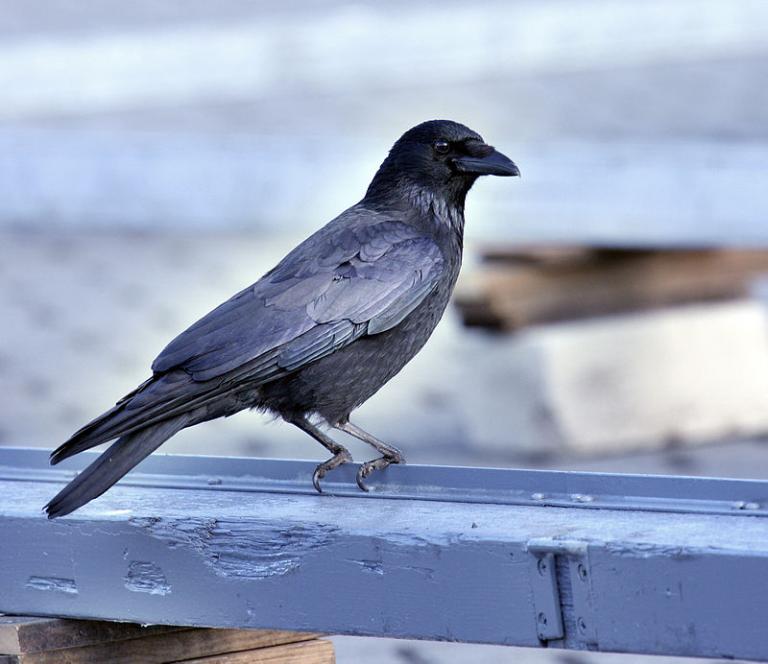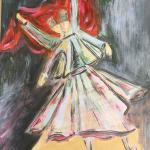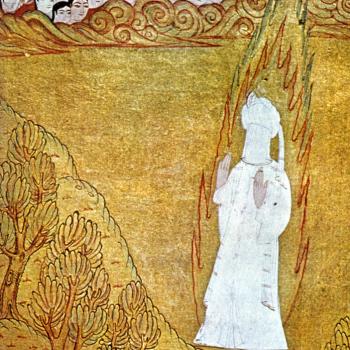
I was walking along the river when I spotted a crow on the railing. Cautiously, I approached it – not too close – and stood by the railing looking over the river with it. Then, I turned my head slowly and said, “Salam.” At first it did nothing, then it leapt into the air and hovered close to my left shoulder, before circling behind my back – ever so close – to hover over my right shoulder. After a few kaws it disappeared into the foliage of the yew tree in the church yard.
I’m no Solomon, but I’ve come to love birds, even – and especially – crows. There is something invigorating about their presence; their kaw, heard on a misty November morning, can be thrilling. Rumi captures it well:
In autumn countless branches and leaves
retreat into the sea of Death—
in the garden the crow clothed in black like a mourner
laments over the withered green.[i]
The crow family – including ravens, rooks, and jackdaws – has a dignity all of its own: harbingers of death, perhaps they can also herald an inner shedding that is necessary for our regeneration. I met the crow mentioned above this spring just gone, shortly before my father passed away.
Birds seem to exert a peculiar fascination over us. Part of it may be due to the simple fact that they are the most visible of all animals (an interesting state of affairs to ponder in itself), and no doubt it has a great deal to do with the beauty of their flight, song, and plumage. And then there is curious pursuit of birdwatching… who has ever heard of mammal-watching, or fish-watching?
Birdwatchers are famously obsessive and have developed their own esoteric vocabulary. I might describe myself as a casual birdwatcher, but I’m no “birder”, and certainly not a “twitcher”. In fact, I had to visit an online forum to understand these terms better:
Birder – a serious Birdwatcher who (almost certainly) owns a scope, watches a local patch (patch worker) , knows his or her stuff, doesn’t carry a field guide and looks for certain birds at certain times of the year. A birder knows birds by call as well as appearance. Keeps a log of his/her sightings and may photograph them or take notes in the field. Likes to find their own birds. May go on the odd twitch occasionally (see below). Birders go out looking for (specific) birds.
Twitcher – a birder who will travel great distances in his home country to see birds he hasn’t seen in that country before. Diagnostic feature – will almost certainly know how many birds they have seen in Britain ! Twitchers chase specific individual birds.
The best Twitchers know their birds extremely well. Some just do it for a bigger list 🙂
The most obsessive will shake, tremble, vomit, cry under pressure especially if they dip out on a lifer.[ii]
“Dip out on a lifer” – what a suggestive phrase… We might sense an almost religious devotion in these twitchers, and it’s interesting that they seem to have come by their name in a similar way to how the Quakers came by theirs. I don’t mean to suggest that twitchers are involved in a conscious spiritual quest, but it does make me wonder why birds affect us so deeply.
In the Quran, birds are linked particularly to the glorification of God:
Are you not aware that it is God whose limitless glory
all creatures in the heavens and on earth praise,
even the birds as they outspread their wings?[iii]
Could it be that birds, and those who devotedly watch them, are fulfilling an innate desire to glorify their Creator? Indeed, for Sufis, birds are symbolic reminders of the angels, those “winged” beings who are also constantly glorifying God we are told. Thinking of my own encounter with the crow and how it hovered over each of my shoulders, how it reminds me now of the “Salam” we Muslims say to the angels over our right and left shoulders at the end of ritual prayer. And if birds are everywhere for our physical eyes to see, might not angels be waiting everywhere for our spiritual eye to see?
Whilst there seems to me to be a very real, yet mysterious, correspondence between birds and angels, birds also remind us of our own higher selves, which have the potential to become angelic. Attar, in the Conference of the Birds, and Keats in “Ode to Nightingale” surely point us towards this possibility. Birds correspond to that part of ourselves that can take spiritual flight and transcend our grasping, earth-bound egos. Rumi makes it clear:
But when disgust at the coarseness of this lowly world seizes me,
I soar up like the birds who spread their wings,
not with feathers that have been glued on,
but with these wings that have grown from my essence.[iv]
Is it any wonder that a bird can cause a twitcher to tremble with such devotion?
Solomon, the Quran suggests, could speak the language of the birds. We might be tempted to understand this solely as a metaphor: Solomon could communicate with angelic forces and awaken the angelic nature within human beings – in all their colourful, richly plumed diversity. Certainly, this may be one of its deeper, esoteric meanings. It seems to be the interpretation which Rumi encourages in the Mathnawi:
Come, O bird-speech of Solomon,
sing the song of every bird that comes.
God, who sent you,
taught you each species’ scale.To the necessitarian bird
speak the language of predestination;
to the bird with broken wings
speak of patience.Keep the patient bird happy,
free from harm;
and for the‘Anqa bird
describe Mount Qaf.Bid the pigeon beware of the falcon;
to the falcon speak of forbearance
and keeping of one’s guard.As for the benighted bat,
make that one an initiate of the Light.Teach the belligerent partridge peace;
for the cockerel display the signs of dawn.Proceed thus from hoopoe to eagle,
and show the way.And God knows best the right course.[v]
Yet, my guess is that Rumi would not have discouraged a literal interpretation of Solomon’s ability to speak the language of the birds – the literal and the metaphorical sometimes go hand-in-hand, the one being no more nor less miraculous than the other. Today, many of us are peering deeply into a reality that defies current scientific models, and no doubt many of us have also experienced moments of extraordinary rapport with birds, animals, and other aspects of nature. Rumi himself seems to have had such “miraculous” encounters with animals if we are to believe the tales told of him, and it is said that even stones spoke to Muhammad (peace be upon him). Shamanic cultures would certainly affirm the possibility of this.
Whether we see Solomon as communicating with birds, angels, or the higher selves within his fellow human beings (or all of these things without exclusion), he may seem like an impossible role model for us to emulate. Yet a Sufi illahi we love to sing in our community goes like this:
Solomon, it’s been said, spoke with birds and stilled the winds.
[Repeat]
Inside of Solomon a Solomon exists.
Inside us all every prophet lives.
[Repeat][vi]
Could the language of the birds be innate within us all?
[i] Mathnawi I, 1892–93, trans. by Kabir and Camille Helminski in The Rumi Daybook
[ii] Accessed at https://ww2.rspb.org.uk/community/wildlife/f/901/t/26348.aspx, posted by seymouraves
[iii] Quran 24:41, trans. by Camille Helminski in The Light of Dawn, A Daybook of Verses from the Holy Qur’an
[iv] Mathnawi II, 3563–64, trans. by Kabir and Camille Helminski in The Rumi Daybook
[v] Mathnawi IV, 85 –58, rendered by the author based on a translation by Reynold A. Nicholson
[vi] “The Ruins of the Heart” from the album Garden Within the Flames by the Dost Quartet












